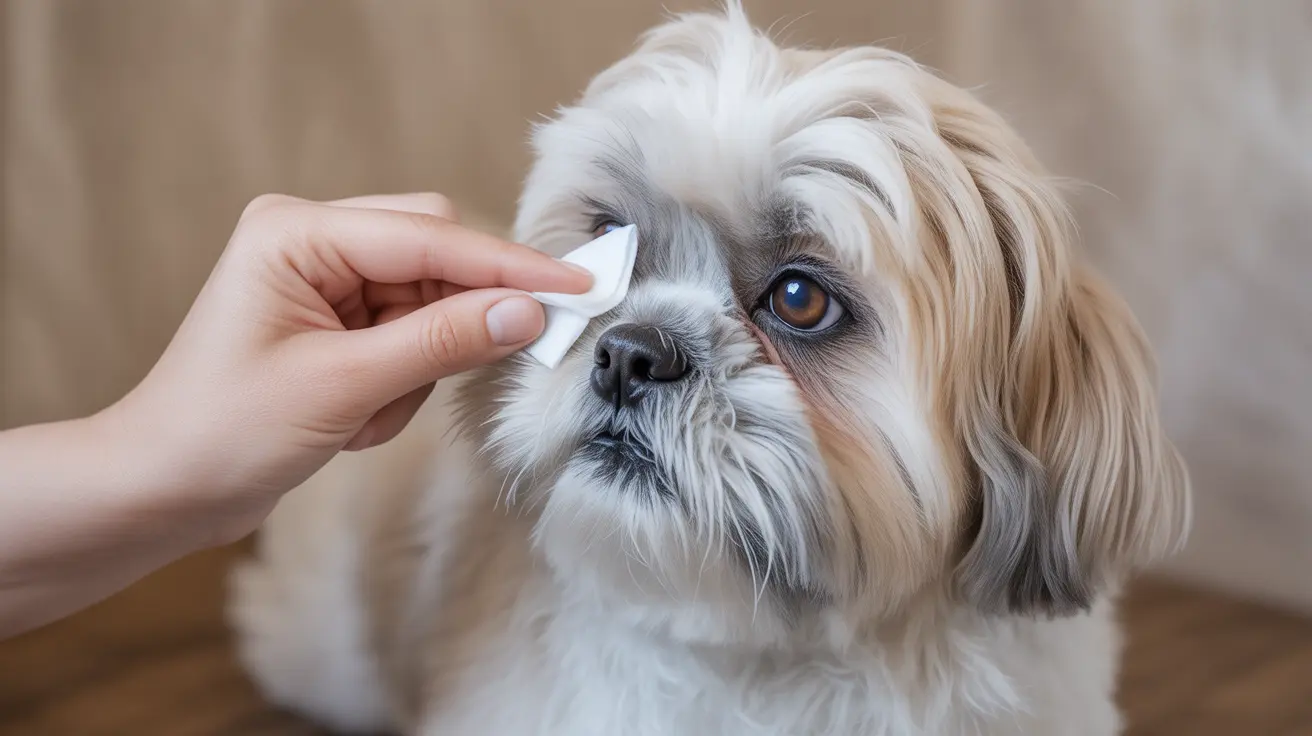Shih Tzu eye discharge is a common concern that many owners face with this beloved breed. Due to their distinctive facial structure and protruding eyes, Shih Tzus are particularly susceptible to various eye conditions that can result in discharge. Understanding the causes, recognizing symptoms, and knowing when to seek veterinary care are crucial for maintaining your Shih Tzu's ocular health.
Whether you're dealing with normal tear production or addressing more serious conditions, this comprehensive guide will help you navigate the complexities of Shih Tzu eye care and ensure your furry friend's eyes remain healthy and comfortable.
Understanding Normal vs. Abnormal Eye Discharge
Not all eye discharge in Shih Tzus indicates a problem. Normal discharge appears clear and watery, occasionally forming small crusties in the corner of the eyes. However, changes in color, consistency, or volume can signal underlying issues that require attention.
Abnormal discharge may appear yellow, green, or bloody, often accompanied by other symptoms such as redness, swelling, or discomfort. These changes warrant immediate veterinary evaluation to prevent potential complications.
Common Causes of Eye Discharge in Shih Tzus
Anatomical Factors
Shih Tzus' brachycephalic (flat-faced) structure makes them prone to various eye issues. Their large, prominent eyes and shallow eye sockets leave them more vulnerable to irritants and injuries, contributing to increased tear production and discharge.
Medical Conditions
Several health conditions can cause eye discharge in Shih Tzus:
- Conjunctivitis (pink eye)
- Blocked tear ducts
- Dry eye syndrome
- Corneal ulcers
- Allergies
- Bacterial or viral infections
Treatment Options and Management
Immediate Care
When you notice abnormal eye discharge, gentle cleaning with a dog-specific eye wipe or warm, damp cloth can provide temporary relief. However, avoid using human eye drops or attempting to treat serious conditions without veterinary guidance.
Professional Treatment
Your veterinarian may recommend:
- Antibiotic or antifungal medications
- Artificial tears
- Surgery for structural issues
- Allergy medications
- Regular cleaning and maintenance routines
Prevention and Daily Care
Maintaining good eye health in Shih Tzus requires consistent attention:
- Daily gentle cleaning around the eyes
- Regular grooming to keep facial hair trimmed
- Protecting eyes from irritants and injury
- Scheduled veterinary check-ups
- Proper nutrition to support eye health
Signs That Require Immediate Veterinary Attention
Contact your veterinarian immediately if you notice:
- Colored or thick discharge
- Excessive squinting or eye rubbing
- Visible swelling or redness
- Changes in vision or behavior
- Signs of pain or discomfort
Frequently Asked Questions
Why do Shih Tzus often develop eye discharge, and what are the most common causes?
Shih Tzus develop eye discharge primarily due to their facial anatomy, including prominent eyes and shallow eye sockets. Common causes include allergies, infections, blocked tear ducts, and their natural tendency to produce tears to protect their exposed eyes.
How can I tell if my Shih Tzu's eye discharge is a sign of a serious medical issue?
Consider discharge serious if it's yellow, green, or bloody, accompanied by redness, swelling, squinting, or changes in behavior. Normal discharge is clear and watery, while concerning discharge often changes in color, consistency, or volume.
What are the best ways to prevent and treat tear stains in Shih Tzus?
Prevent tear stains through daily gentle cleaning, keeping facial hair trimmed, using dog-specific eye wipes, and addressing underlying causes with your veterinarian. Regular maintenance and proper hygiene are essential for management.
How do I know if my Shih Tzu needs immediate veterinary care for eye discharge?
Seek immediate veterinary care if you notice colored discharge, significant swelling, excessive squinting, signs of pain, or any sudden changes in your dog's eye appearance or behavior.
What steps can I take at home to help reduce and manage my Shih Tzu's eye discharge?
Maintain regular cleaning routines using appropriate pet products, keep facial hair trimmed, protect eyes from irritants, and follow your veterinarian's recommended care plan. Never use human eye products or attempt to treat serious conditions without professional guidance.






